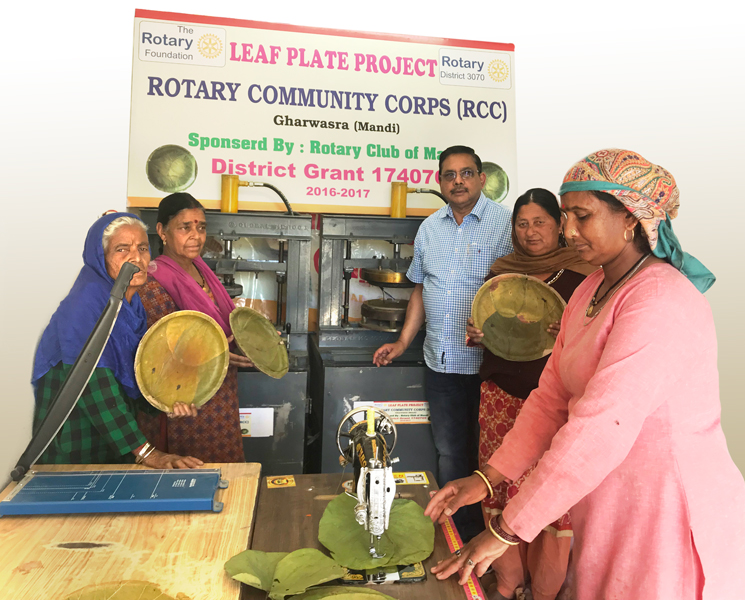Even before the ban on plastic and thermocol plates and cutlery was announced by Jai Ram Thakur, the Chief Minister of Himachal Pradesh, Rotary Club of Mandi, D 3070, had taken the lead in spreading awareness on the use of biodegradable plates with an aim to help rural women in Gharwasra village near Mandi to earn a decent living. Through its RCC of 20 women, the club recently set up a leaf-plate manufacturing unit in the village.

In the past, the club has held medical camps, distributed water filters, conducted cleanliness drives and encouraged the region’s children to go to school. Surender Mohan, past president of the club, says that the women in the village were making patal or leaf plates earlier too. But the shelf life of the plates was less than three days and it had a rough finish which resulted in wastage of time, material and money. There were few buyers for the plates. “So, they approached us for a solution and we began our research.”
Not satisfied with the results of the leaf manufacturing machine available in Kolkata, “I visited Hyderabad to check out the machine developed by the National Institute of Rural Development,” he says. On his return he filed a project summary and waited for the district grant to come through. “The Rotary Foundation approved the project and with the funds received, we placed an order for the machine and began work in April.” The complete-cost of the project was ₹1,50,000.
The 20 women who work in the unit initially found it difficult to understand how it operates. Says Vimala, a plate maker: “I have never been to school so couldn’t understand how to run the machine. But Padma didi helped me.” Today, on an average, three women make 1,000 plates in eight hours. Padma, the RCC secretary, says confidently, “We are able to send our children to school, what more do we want? If need be, we will work harder.” What she likes about this machine most is that, “we don’t have to hand stitch the leaves anymore which means no more needle pricks.”
The unit manufactures 12-inch leaf plates and 6-inch dunu (leaf bowls). While compared to the earlier 900 plates in 12 hours for ₹1 each, they now can make 1,000 plates in 8 hours, which are sold for ₹4,000. The cost of production of these plates is ₹2,000. This has doubled their income. These plates and bowls are sold locally for use in marriages and temple festivals. With the ban on thermocol and plastic plates being actively implemented all over Himachal, the orders for the plates have also doubled, says Mohan.
“We have sufficient orders for this year and if we make a surplus, we will see if we can invest in exporting these plates to Germany and the US.” Quoting details from a research done by the Department of Pharmacy, Bansthali University, Rajasthan, he says the biodegradable plates have many good effects on health too. “The plates are made without glue or additives, and they disintegrate into the soil in 28 days. As eco-friendly products have become the norm nationally and internationally, these plates mean good business.”





